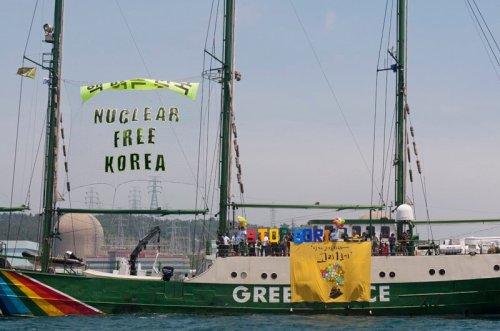Group to open Korean office soon to focus on nuclear power, maritime environment
The main issues in Korea in the last 10 years have been peace, environment and energy. Greenpeace’s announcement in June that it would open a Korean office looks set to stir these issues further.
Greenpeace started in Vancouver in 1971 to protest nuclear weapons testing. Its Korean office, to be opened late this month, will be the 41st worldwide.
Elsewhere in Asia, Greenpeace runs branches or offices in Japan, China, Hong Kong and Taiwan.
The main issues in Korea in the last 10 years have been peace, environment and energy. Greenpeace’s announcement in June that it would open a Korean office looks set to stir these issues further.
Greenpeace started in Vancouver in 1971 to protest nuclear weapons testing. Its Korean office, to be opened late this month, will be the 41st worldwide.
Elsewhere in Asia, Greenpeace runs branches or offices in Japan, China, Hong Kong and Taiwan.

Local media expects the Greenpeace Seoul office to focus on nuclear power and maritime ecology. It is also expected to boost the local environmental movement.
“The non-governmental organizations and young people here in Korea are strongly motivated to do something for the environment. It is our intention as a global network to reach out to them and provide them with opportunities to do so,” said Rashid Kang, manager of Greenpeace’s Seoul Office.
After the Cold War ended, Greenpeace shifted its focus to pursuing peace on the basis of the environment, he added.
To draw attention to the launch of the Greenpeace Korea office, the Rainbow Warrior, one of the organization’s environmental surveillance ships, visited Korea and toured the southeastern coast of the country, where many of its nuclear power plants are located.
Greenpeace and one of the nation’s largest environmental groups have teamed up to call for a nuclear-free Korea. Mario Damatao, Greenpeace executive director of East Asia, came along to make the announcement of the planned Korean office launch and decried nuclear operations in Korea.
Greenpeace supporters, together with local activists, boarded the ship and held anti-nuclear protests at sea.
“We are still at the stage of looking for a physical office and recruiting staff, but Rainbow Warrior’s visit was actually the first official Greenpeace activity in Korea,” Kang said.
Rainbow Warrior’s visit to Korea and its joint action with local environmentalists signal the issues Greenpeace Korea will tackle. The announcement that it would open its Korean office and anti-nuclear protests seemed enough to make the authorities here watchful of future Greenpeace actions. According to local news media, the Korea Nuclear Energy Promotion Agency under the Ministry of Knowledge Economy will seek to set aside 10 billion won ($9.3 million) next year to beef up the publicity of nuclear energy safety.
Korea is a country facing a spate of environmental issues, especially regarding marine life, because it is a peninsula.
Since 1997 when Greenpeace kicked off its East Asia office in Hong Kong, its staff were committed to China and India, the two countries which are not only largest in size but also the most turbulent in terms of social and economic developments.
Even so, other Asian countries have been on Greenpeace’s radar. Since 1993, Greenpeace has been addressing nuclear issues and offered training to local activists in Korea, according to the Seoul office manager.
“With a physical office and a group of permanent staff, we will be able to gain more effective access to the Korean government and the local citizen society,” Kang said.
The introduction of a Korean branch came all the more in time, following meltdowns at the quake-stricken Fukushima atomic plants in March which sparked fresh concerns over the safety and environmental impact of nuclear power.
Kang says those who cry “not in my backyard” are of no help in solving most environmental problems. In a global world, he says, an ecological crisis in a neighboring state or region may no longer be restricted to someone else’s backyard.
That is why Greenpeace felt it necessary to establish itself in Korea despite the existence of local activist groups.
“In order to properly address one issue, especially regarding the environment, we must address the entire world in various levels and views,” he said.
For this, the organization will be working with various stakeholders, including the local government, NGOs and the media.
One of Greenpeace Korea’s priorities will be to offer valid and effective solutions to climate and energy problems that the government should tackle. However, to Kang’s eyes, the Korean government policies are largely revenue-oriented. “Greenpeace is not against development, despite the general misunderstanding. Our goal is to find a balance point where development and environment may coexist for their mutual sake.”
Lately, Greenpeace engaged in activities to preserve tuna in Asian seas. Tuna is one of the world’s most profitable and in-demand fish and is highly vulnerable to overfishing. Kang says that Greenpeace intend to maintain the economic benefits of tuna fishing, as well as controlling the global haul level.
Greenpeace Seoul Office’s immediate goal for this year may be to secure the best possible staff to convey the messages of the organization in a fashion to meet local needs.
“Our biggest goal and challenge here would be to frame and repackage our contents in accordance with Korea’s unique characteristics,” he said.
An official website is scheduled to open by the end of the year. Until then, information on Greenpeace Seoul may be found on http://www.facebook.com/greenpeace.kr.
By Bae Hyun-jung (tellme@heraldcorp.com)








![[Kim Seong-kon] Democracy and the future of South Korea](http://res.heraldm.com/phpwas/restmb_idxmake.php?idx=644&simg=/content/image/2024/04/16/20240416050802_0.jpg&u=)







![[KH Explains] Hyundai's full hybrid edge to pay off amid slow transition to pure EVs](http://res.heraldm.com/phpwas/restmb_idxmake.php?idx=652&simg=/content/image/2024/04/18/20240418050645_0.jpg&u=20240418181020)

![[Today’s K-pop] Zico drops snippet of collaboration with Jennie](http://res.heraldm.com/phpwas/restmb_idxmake.php?idx=642&simg=/content/image/2024/04/18/20240418050702_0.jpg&u=)